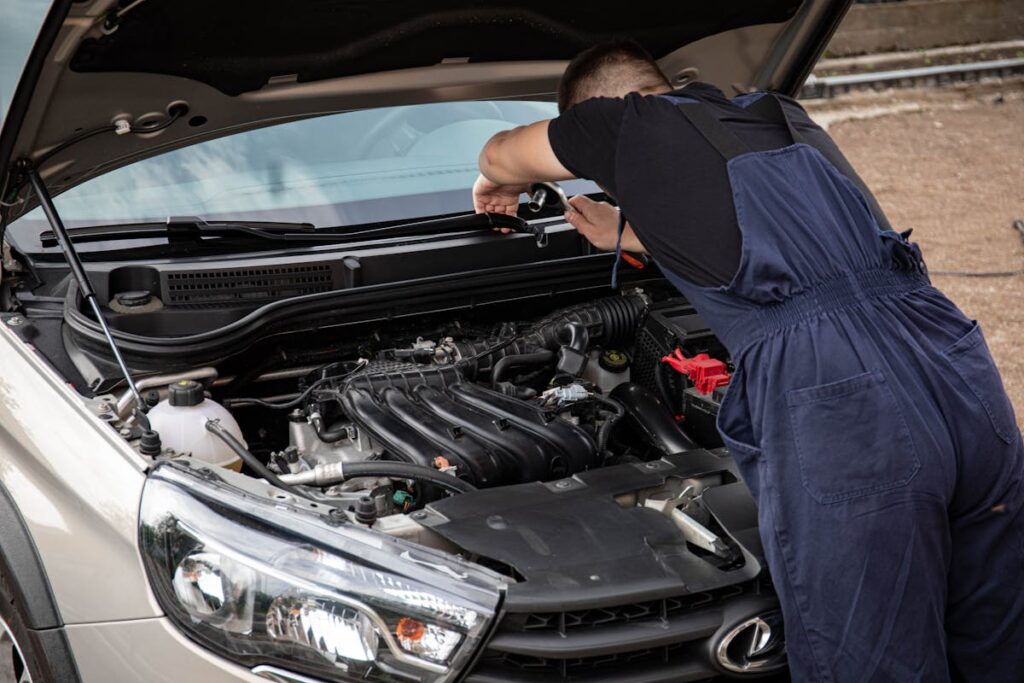Faulty vehicle-related accidents pose significant legal challenges for companies, exposing them to severe financial penalties, lawsuits, and mandatory recalls. These consequences arise from non-compliance with safety regulations and standards, causing consumer harm. Such legal actions not only demand compensation for victims but also threaten a company’s reputation and market position. Understanding these repercussions is essential for manufacturers aiming to mitigate risks and maintain corporate accountability. What steps can companies take to safeguard against these legal pitfalls?
Understanding Product Liability in the Automotive Industry
Product liability in the automotive industry is a critical legal concept that holds manufacturers, distributors, and retailers accountable for defects that cause harm to consumers. This liability hinges on adherence to product standards and safety regulations designed to guarantee consumer trust. Manufacturers are expected to uphold ethical practices by thoroughly identifying and rectifying defects during production. Legal frameworks require that any breach of manufacturer responsibility, especially in defect identification, is promptly addressed to mitigate risks. Liability insurance plays a pivotal role in covering potential financial repercussions arising from such defects. Guaranteeing compliance with established safety regulations fosters consumer confidence and minimizes legal exposure. Ultimately, robust product standards and manufacturer diligence are essential for maintaining the integrity of the automotive industry and protecting consumer interests.
The Role of Government Regulations and Compliance
Government regulations play an essential role in shaping the automotive industry’s landscape by setting safety standards that manufacturers must comply with to guarantee consumer protection. These regulations mandate rigorous testing and quality assurance protocols, ensuring that vehicles meet specified safety criteria before entering the market. Government oversight is critical in maintaining these standards, as it serves to monitor manufacturers’ adherence to regulatory compliance. Failure to comply with these standards can result in severe legal repercussions, including recalls and penalties. Regulatory bodies conduct regular inspections and audits, providing an additional layer of accountability. This oversight minimizes the risk of defective vehicles causing harm. Consequently, adherence to government regulations is not merely a legal obligation but an essential component for maintaining public trust and safety.
Financial Repercussions of Vehicle Defects
Vehicle defects can lead to substantial financial consequences for companies, primarily through compensation and settlement costs following accidents. These expenses often escalate as companies are required to address both individual claims and potential class-action lawsuits. Additionally, the occurrence of vehicle defects can result in increased insurance premiums, further impacting a company’s financial stability.
Compensation and Settlement Costs
Financial implications of vehicle defects often manifest through compensation and settlement costs that companies must bear following accidents. These financial burdens are influenced by various compensation models which determine the extent of monetary redress owed to victims. Companies frequently engage in settlement negotiations to mitigate potential litigations and manage public relations effectively. Such negotiations aim to reach an agreement on compensation amounts without resorting to lengthy court proceedings. The costs incurred can vary considerably based on factors including the severity of the defects, the extent of injuries, and historical legal precedents. Additionally, companies might face class action lawsuits, further complicating financial liabilities. Each settlement outcome contributes to the overall financial strategy companies adopt to address the repercussions of defective vehicles, aiming to minimize impact.
Insurance Premium Increases
In the aftermath of vehicle defects, companies often encounter increasing insurance premiums as insurers adjust their risk assessments. Insurers perceive defective vehicles as heightened insurance risks, prompting an extensive premium assessment to counter potential financial liabilities. Faulty vehicles elevate the likelihood of claims, consequently impacting the insurer’s evaluation of risk exposure. As a result, firms experience an upward adjustment in premium costs, reflective of the perceived increased risk profile.
The correlation between vehicle defects and insurance risk is a critical factor in premium assessment. Insurers meticulously analyze historical data and defect rates to quantify risk, often leading to substantial premium hikes. Companies must thus strategize on risk management and defect mitigation to stabilize insurance costs, ensuring financial sustainability amid defect-related challenges.
Class-Action Lawsuits and Their Impact
How do class-action lawsuits reshape the landscape for companies following vehicle accidents? Class action dynamics considerably influence corporate behavior by consolidating numerous individual claims into a single lawsuit. This legal mechanism amplifies consumer advocacy, allowing affected individuals to pool resources, thereby enhancing negotiating power against corporations. Companies facing class actions must address systemic issues rather than isolated incidents, often leading to substantial financial settlements or verdicts. Additionally, the potential for reputational harm incentivizes firms to prioritize rigorous safety and quality controls to prevent future liabilities. The overarching impact of such lawsuits extends beyond immediate financial implications, compelling companies to adopt more transparent and consumer-focused practices. Consequently, class-action lawsuits serve as a critical check on corporate accountability in the automotive industry.

Navigating Recall Procedures and Obligations
When vehicle defects emerge, companies are obligated to navigate recall procedures with precision and diligence to mitigate potential hazards. Effective recall communication strategies are essential to guarantee that all stakeholders, including consumers and dealers, receive clear and timely information about the defects and necessary corrective actions. Companies must establish robust systems to disseminate recall notices and updates efficiently, minimizing the risk of miscommunication. Additionally, implementing thorough dealer training programs is significant. These programs equip dealers with the necessary knowledge and skills to address consumer inquiries and perform required repairs or replacements accurately. By focusing on these areas, companies can manage recalls effectively, maintaining trust and reducing liability. Overall, adherence to structured recall processes is critical for safeguarding public safety and corporate reputation.
The Influence of Consumer Protection Laws
While structured recall processes are pivotal for managing vehicle defects, consumer protection laws considerably shape the framework within which these processes operate. These laws establish clear guidelines to guarantee consumer rights are upheld, compelling manufacturers to adhere to stringent regulatory compliance standards. Companies must conduct thorough investigations into defects, promptly notify consumers, and execute recalls effectively. Failure to comply with these legal obligations can result in significant penalties and reputational damage. Regulatory bodies play a critical role in enforcing these laws, maintaining a balance between corporate accountability and consumer safety. By fostering transparency and responsibility, consumer protection laws not only safeguard public welfare but also guide companies in refining their operational protocols to prevent future liabilities.
Case Studies of Notable Faulty Vehicle-Related Accidents
The examination of notable faulty vehicle-related accidents reveals significant legal and financial repercussions for major automotive companies. Incidents such as the Toyota sudden acceleration, the GM ignition switch scandal, and the Ford Pinto exploding fuel tanks highlight systemic failures in manufacturing and safety oversight. These cases illustrate the critical need for robust safety protocols and the potential consequences of corporate negligence.
Toyota Sudden Acceleration Incidents
Toyota’s sudden acceleration incidents serve as a critical example of the complexities companies face when dealing with faulty vehicle-related accidents. The challenges surrounding Toyota safety stemmed from acceleration issues that led to numerous accidents and fatalities. These incidents highlighted significant concerns regarding consumer trust, as many questioned the reliability of Toyota vehicles. The legal ramifications were substantial, with Toyota facing extensive litigation and hefty financial settlements. In 2014, the company agreed to pay over $1 billion to resolve numerous lawsuits. This situation underscores the importance for automotive manufacturers to guarantee rigorous safety standards and transparent communication with consumers. The case exemplifies how addressing technical flaws promptly can mitigate legal consequences and restore consumer confidence in a brand’s commitment to safety.
GM Ignition Switch Scandal
Examining another significant case of vehicle-related safety failures, the GM ignition switch scandal reveals the intricate legal and ethical challenges that arise when automotive defects are not addressed promptly. The ignition switch defect in several GM models led to the stalling of vehicles, disabling airbags, and increasing the risk of fatal accidents. GM’s delayed response to ignition safety regulations resulted in a lengthy investigation and a recall impacting millions of vehicles. The gm recall procedures were scrutinized, highlighting deficiencies in identifying and rectifying defects promptly. Legal repercussions included a substantial settlement and heightened regulatory oversight. This case underscores the critical importance of compliance with ignition safety regulations and the implementation of effective recall procedures to protect consumer safety and corporate reputation.
Ford Pinto Exploding Fuel Tanks
A pivotal case in automotive safety history, the Ford Pinto exploding fuel tanks incident, exemplifies the severe repercussions of neglecting vehicle design flaws. Introduced in the 1970s, the Pinto became infamous for its controversial design, which placed fuel tanks in a vulnerable location, leading to catastrophic fires in rear-end collisions. The Pinto controversy underscored significant safety concerns, as evidence revealed that Ford had prior knowledge of the defect but opted against corrective measures due to cost considerations. This decision resulted in numerous fatalities and injuries, prompting widespread public outcry and scrutiny. Legally, Ford faced multiple lawsuits and was criticized for prioritizing profit over consumer safety, ultimately leading to increased regulatory standards in the automotive industry and enhanced focus on vehicle safety.
Strategies for Risk Mitigation and Prevention
Preventing vehicle accidents requires extensive strategies that focus on risk mitigation and proactive measures. Central to these strategies is thorough risk assessment, which involves identifying potential hazards and evaluating the likelihood and impact of vehicle-related incidents. This process enables companies to prioritize areas that require immediate attention and allocate resources effectively. Additionally, implementing rigorous employee training programs is essential. These programs should educate employees on safety protocols, proper vehicle operation, and emergency response procedures. By equipping employees with the necessary knowledge and skills, companies can markedly reduce the occurrence of accidents. Moreover, regular maintenance checks and adherence to industry standards guarantee vehicle integrity, further minimizing risks. Collectively, these measures foster a culture of safety and prevention, ultimately safeguarding companies from legal repercussions.
The Long-Term Implications on Brand Reputation
While effective strategies for risk mitigation contribute greatly to preventing vehicle accidents, the long-term implications on a company’s brand reputation must also be considered. A faulty vehicle-related accident can severely impact brand loyalty, eroding consumer trust and creating negative associations with the brand. Consumers often perceive companies involved in such incidents as neglectful of safety standards, which can lead to diminished market share and reduced profitability over time. Rebuilding brand reputation requires significant investment in public relations and transparent communication, focusing on rectifying the underlying issues and demonstrating a commitment to consumer safety. Companies must consequently prioritize consistent quality control and proactive risk management to sustain consumer trust and maintain brand loyalty in the competitive automotive industry.
Frequently Asked Questions
How Can Companies Ethically Handle Public Relations After a Vehicle-Related Accident?
Companies can ethically handle public relations by implementing crisis communication strategies that prioritize transparency and integrity. Ethical accountability requires acknowledging responsibility, timely updates, and demonstrating commitment to corrective actions to restore trust and public confidence.
What Are the Steps for Companies to Regain Consumer Trust Post-Accident?
To regain consumer trust post-accident, companies should implement transparency initiatives, ensuring clear communication about corrective actions. Additionally, enhancing customer engagement through open dialogue and feedback channels can foster trust and demonstrate commitment to safety and improvement.
How Do Faulty Vehicle Accidents Impact Employee Morale Within a Company?
Faulty vehicle accidents can considerably impact employee morale, often leading to decreased employee engagement. During accident recovery, employees may experience heightened anxiety and reduced confidence in management, potentially hindering productivity and overall workplace cohesion if not addressed promptly.
Are There International Differences in Handling Vehicle-Related Accidents Legally?
International laws on accident liability vary considerably, reflecting diverse legal frameworks, cultural attitudes, and regulatory standards. Each jurisdiction prescribes distinct procedures for determining fault, compensation, and penalties, impacting how vehicle-related accidents are addressed globally.
How Can Companies Use Technology to Prevent Future Vehicle Defects?
Companies can leverage predictive maintenance and data analytics to identify potential vehicle defects before they occur. By analyzing historical and real-time data, they can predict failure patterns, schedule timely maintenance, and enhance overall vehicle reliability and safety.

